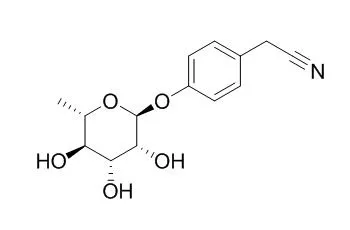In the course of studies on the isolation of bioactive compounds from Philippine plants, the seeds of Moringa oleifera Lam. were examined and from the ethanol extract were isolated the new O-ethyl-4-(alpha-L-rhamnosyloxy)benzyl carbamate (1) together with seven known compounds, 4(alpha-L-rhamnosyloxy)-benzyl isothiocyanate (2), niazimicin (3), Niazirin (4), beta-sitosterol (5), glycerol-1-(9-octadecanoate) (6), 3-O-(6'-O-oleoyl-beta-D-glucopyranosyl)-beta-sitosterol (7), and beta-sitosterol-3-O-beta-D-glucopyranoside (8).
METHODS AND RESULTS:
Four of the isolates (2, 3, 7, and 8), which were obtained in relatively good yields, were tested for their potential antitumor promoting activity using an in vitro assay which tested their inhibitory effects on Epstein-Barr virus-early antigen (EBV-EA) activation in Raji cells induced by the tumor promoter, 12-O-tetradecanoyl-phorbol-13-acetate (TPA). All the tested compounds showed inhibitory activity against EBV-EA activation, with compounds 2, 3 and 8 having shown very significant activities. Based on the in vitro results, niazimicin (3) was further subjected to in vivo test and found to have potent antitumor promoting activity in the two-stage carcinogenesis in mouse skin using 7,12-dimethylbenz(a)anthracene (DMBA) as initiator and TPA as tumor promoter.
CONCLUSIONS:
From these results, niazimicin (3) is proposed to be a potent chemo-preventive agent in chemical carcinogenesis. |






 Cell. 2018 Jan 11;172(1-2):249-261.e12. doi: 10.1016/j.cell.2017.12.019.IF=36.216(2019)
Cell. 2018 Jan 11;172(1-2):249-261.e12. doi: 10.1016/j.cell.2017.12.019.IF=36.216(2019) Cell Metab. 2020 Mar 3;31(3):534-548.e5. doi: 10.1016/j.cmet.2020.01.002.IF=22.415(2019)
Cell Metab. 2020 Mar 3;31(3):534-548.e5. doi: 10.1016/j.cmet.2020.01.002.IF=22.415(2019) Mol Cell. 2017 Nov 16;68(4):673-685.e6. doi: 10.1016/j.molcel.2017.10.022.IF=14.548(2019)
Mol Cell. 2017 Nov 16;68(4):673-685.e6. doi: 10.1016/j.molcel.2017.10.022.IF=14.548(2019)